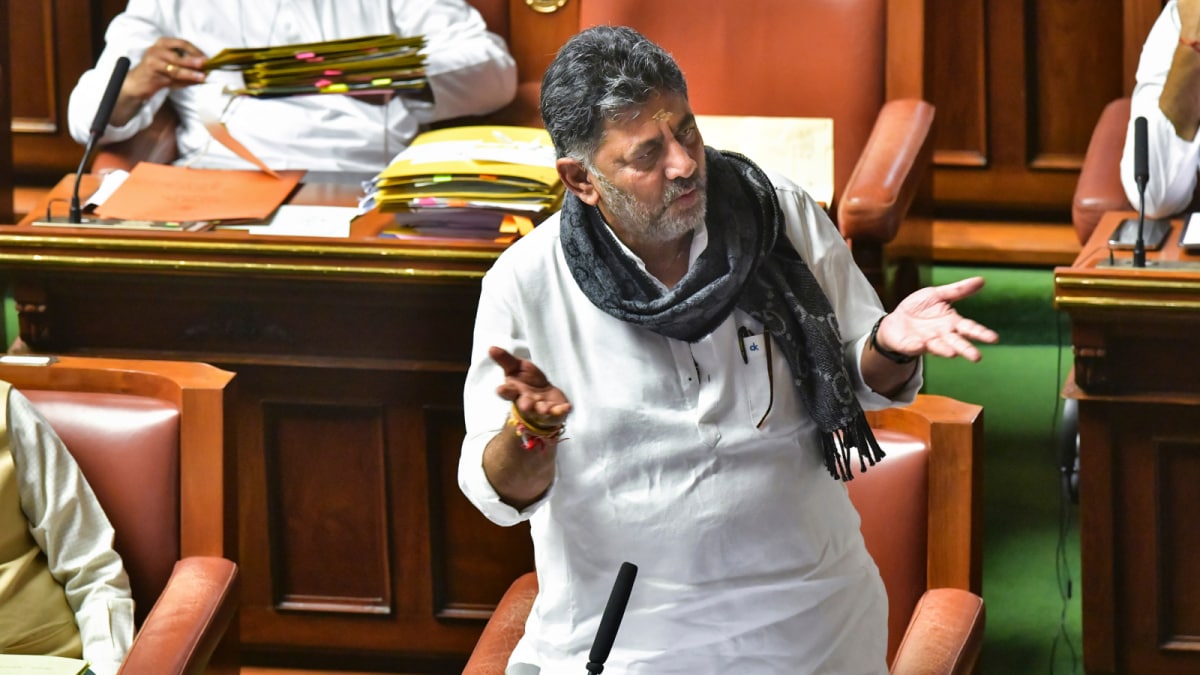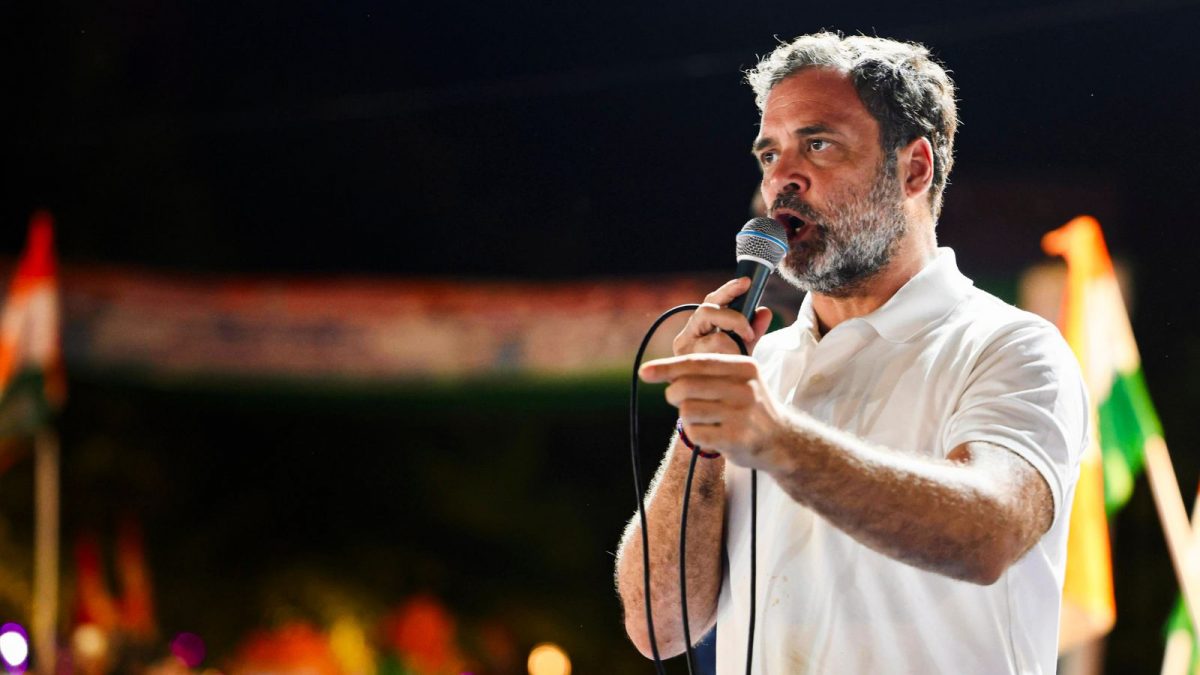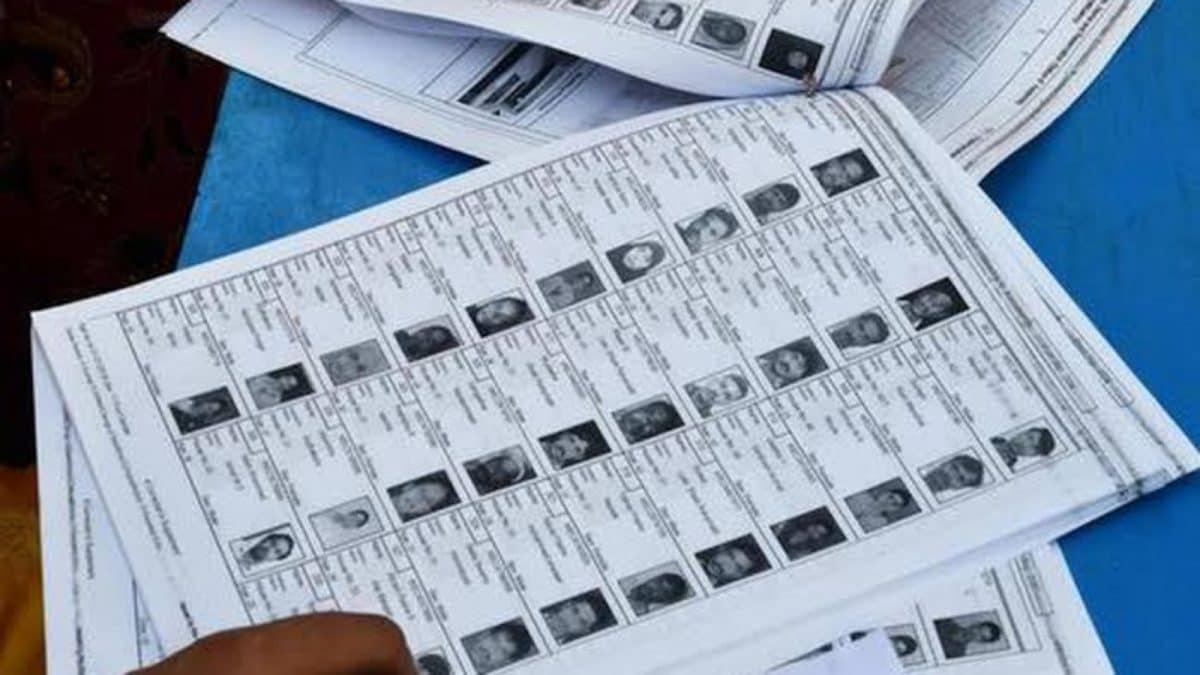Last Updated:
The Congress government presented the bill as a means to improve governance in the rapidly growing metropolis, while the BJP accused the Congress of seeking to centralise power.

Dy CM DK Shivakumar speaks in Karnataka Assembly. (Image: PTI)
The Greater Bengaluru Governance (Amendment) Bill, 2025 sparked intense debate in the Karnataka Assembly, with both the ruling Congress and the Opposition BJP clashing over its implications for the city. The Congress government presented the bill as a means to improve governance in the rapidly growing metropolis, while the BJP accused the Congress of seeking to centralise power and diminish the role of elected officials.
Chief Minister Siddaramaiah rebutted these claims, accusing the Opposition of distorting facts to mislead the public.
The bill, introduced by Deputy Chief Minister DK Shivakumar, who also oversees Bengaluru Development, was passed by the Karnataka Legislative Assembly on Monday. The discussions were marked by heated exchanges, with BJP leaders arguing that the amendment would undermine the autonomy of corporators and concentrate power in a few hands. Congress ministers dismissed these concerns as mere political posturing.
An amusing moment occurred when MLA Munirathna attempted to disrupt the discussion on the Greater Bengaluru Authority (GBA). Shivakumar quipped, “We will give you an opportunity to participate, don’t worry. We had forgotten about you as you are busy running around between SIT’s and investigations,” a comment that elicited laughter from the legislators.
What did Shivakumar say?
During the debate, Shivakumar clarified that the amendment aimed to ensure the GBA would not interfere with the operations of municipal corporations. He explained, “Some people filed a PIL alleging the Authority had powers to take control of corporations. Though the court did not accept the PIL, we brought this amendment to prevent any confusion in the future.”
So why was the amendment made?
Shivakumar elaborated that despite the PIL being dismissed, the amendment was necessary to make it clear that “the GBA will not interfere in the functioning of the corporations” and to prevent future misunderstandings. He emphasized that the amendment was intended to protect the autonomy of the Mayor and councillors as per the Constitution. He also highlighted the disparity in tax contributions, pointing out that areas like Mahadevapura contribute the most taxes in Bengaluru, while central areas collect far less.
He reassured that Mayors and corporators would retain their constitutional powers. Addressing concerns about the inclusion of villages and financial assistance, Shivakumar noted that constitutional rules limited direct fund transfers. “We will deliberate on which villages to include and are ready to withdraw the amendment if the Opposition disagrees,” he said.
Reiterating the government’s non-political stance on governance, Shivakumar stated, “We do not want to do politics over Bengaluru’s future. The government will not interfere with financial independence, tax collection, elections, or reservation. The 74th amendment has been fully protected.” A notification is expected by August 25, after the Governor’s assent.
Why is the BJP objecting?
The Karnataka BJP strongly opposed the Bill, arguing that it undermines the Constitution’s spirit. Opposition members claimed that the Greater Bengaluru Authority, led by the Chief Minister, was designed to weaken the autonomy of city corporations. “The Bill is undemocratic and against the spirit of decentralisation,” they argued.
Leader of the Opposition R. Ashok criticised the proposed name ‘Greater Bengaluru’, suggesting a Kannada name instead. He warned that Kannadigas might lose their political voice in areas with high migrant populations, citing Delhi’s failed experiment with multiple corporations as a cautionary example. He also noted the potential economic disparities due to differing revenue contributions from areas like Mahadevapura.
The key contention in the Bill
A primary point of contention was the proposal to divide Bengaluru into several municipal corporations, which the BJP opposed. The Opposition argued that splitting the city would reduce native Kannadiga control, particularly in migrant-dominated areas. Ashok called it an “emotional issue,” warning the government of long-term repercussions.
“Secondly, the concept of decentralisation has been damaged and freedom taken away. The corporation should have been independent, but you have made it a parasite by dividing it into five divisions. If one corporation collects good revenue, another will go bankrupt. They will come under the grip of the government,” he said.
Ashok further criticized the Bill, stating, “Former PM late Rajiv Gandhi brought the 73rd Amendment to the Constitution, but this Bill goes against its objectives. What benefit will the people of Bengaluru get? This is not decentralisation of power. Since Dy CM Shivakumar is in charge of Bengaluru, there is centralisation of power. We don’t want this. You may have the majority and get it passed, but this is not in the interest of society. Roll back this Bill.”
Raising concerns over discrimination politicking
Other BJP MLAs, including Yelahanka’s SR Vishwanath, cautioned that the Congress-led government might politically discriminate in allocating funds to corporations, especially if different parties controlled the state and civic bodies. They urged the government to wait until the ongoing delimitation exercise was completed to avoid confusion in constituency boundaries.
Former Deputy CM and MLA CN Ashwath Narayan appealed to Congress MLAs to protect local bodies’ rights. He warned that judicial intervention might become necessary if constitutional objectives were not upheld. He questioned the need for the PIL against the GBA Act and highlighted the importance of local bodies functioning independently as per the Constitution.
Narayan elaborated, “The head of the state is the Chief Minister, and the head of the GBA is also the Chief Minister. The freedom and empowerment that should have been given to local bodies are taken away through this Bill. The Greater Bengaluru Governance Act, overall, intends to interfere, and this is evident.”
He demanded more autonomy for civic bodies, arguing that local bodies should have authority over tax collection. “If the CM and Dy CM interfere, how will you save democracy?”
Congress defends the Bill
Shivakumar responded to the Opposition, emphasising the need for proper governance in Bengaluru. He invited open discussions, stating, “There must be clarity in this matter. Bengaluru needs proper governance. Let us discuss this for a full day if needed. Opposition members have more experience than us, and I am ready to accept their suggestions. If there are flaws in our draft, we will correct them. There is no secrecy here. We even formed a House Committee for open discussions.”
He assured that the government would consider Opposition leaders’ opinions while finalising the bill. “Let us first conduct elections. August 18 was the last date for objections, August 25 is the deadline for the Governor’s assent, and the final notification will be issued on September 2.”
BJP members questioned the necessity of a GBA headed by the Chief Minister when Mayors already head city corporations. They warned that multiple corporations would create revenue and development imbalances. They also raised concerns about notices sent to 30,000 households demanding additional taxes and accused the Commissioner of bypassing MLAs on various issues.
Congress leaders defended the Bill, highlighting its importance in addressing Bengaluru’s civic issues. Shivajinagar MLA Rizwan Arshad, who chaired the Joint Committee for GBA, stressed the need for decentralisation due to the city’s diverse problems. Shivakumar rejected claims that the Bill aimed to divide the city, arguing that administrative efficiency required such measures. “This is only a small amendment for the sake of clarity. The government’s intention is to ensure no interference in the administration of city corporations,” he explained.

Rohini Swamy, Associate Editor at News18, has been a journalist for nearly two decades in the television and digital space. She covers south India for News18’s digital platform. She has previously worked with t…Read More
Rohini Swamy, Associate Editor at News18, has been a journalist for nearly two decades in the television and digital space. She covers south India for News18’s digital platform. She has previously worked with t… Read More
Read More








